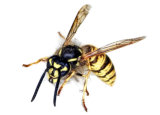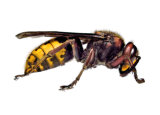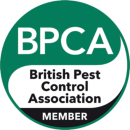
Wasp Nest Removal in the Hampshire and Dorset Area
If you have a problem wasp nest at your property or work place the Pest Professionals in Hampshire and Dorset can help. We provide you with instant help in two very effective steps:
We will help you to evaluate your issue and give you immediate, honest and FREE advice … without obligation
Your local Pest Professional will come round to sort the issue out quickly and without fuss
The no obligation telephone consultation service applies to both residential and business customers in the Hampshire and Dorset area. No wasp nest removal job is too big or too small for us to look at. Where relevant we are able to advise on any immediate steps required to protect your health, property or possessions before a visit. If a visit is needed we let you know if there will be a call out fee and advise on the probable costs of any insect treatment should it be necessary.
Wasps & Problem Wasp Nests
The common wasp lives in colonies which develop throughout the summer months and can cause serious alarm when present in greater numbers or when colonies are close to humans. Many thousands of wasps can serve a single queen and commonly their nests are concealed in hard-to-reach locations, in some cases underground or in cavities in properties or loft spaces. Wasps react in a hostile manner to being disturbed and can attack in swarms in this circumstance and are very likely to inflict a painful sting, which can be life-threatening to those with allergies. Without a doubt a sting in the throat could be fatal. Under no circumstances should any person but a qualified pest controller attempt removal of a wasp nest.
Identification
This is rarely an issue with wasps, which have a black and yellow abdomen pattern, black head and thorax, six legs and heavily-veined wings. An adult wasp is much the same in size to a worker honey bee at 12-15mm in length. Queens are much larger, at around 20mm.
What Is The Difference Between Wasps And Hornets?


Hornets are larger than wasps at 20-30cm. Wasps are black and yellow with little hair, whereas hornets are more normally chestnut brown and yellow with some hair. Wasps are likely to feast on food waste and sugary substances and some insects, and can swarm when provoked. Hornets mainly feed on insects and do not swarm. Wasps are quick to sting and can sting repeatedly, and are common in late summer. Hornets usually sting only when provoked and are seen between May and September.
Wasp Nest Removal
Never take on a wasps’ nest yourself. Wasp nest removal must only ever be dealt with by an experienced and qualified pest controller who has the right protective clothing and the correct professional strength extermination products. One visit is normally enough to exterminate a wasp nest colony.
If you need sound advice or fast solutions to your wasp issue anywhere in the towns and villages of Hampshire and Dorset – get in touch.








































